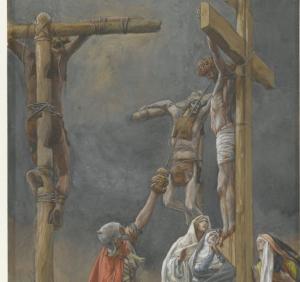
This post reflects on Jesus’ obedient thirst for God and our eternal wellbeing that led to his passion, crucifixion, death, burial, and resurrection. This sequence of events spanning the evening of Maundy Thursday to Easter Sunday is known as the Easter Triduum. May the Lord’s passion for God and us quicken us to obey our own thirst for God and righteousness.
The Psalmist’s Thirst for God
The psalmist reflects upon their passionate thirst for God: “As a deer pants for flowing streams, so pants my soul for you, O God. My soul thirsts for God, for the living God. When shall I come and appear before God?” (Psalm 42:1-1; ESV) Such desire marks Jesus’ life supremely. Jesus also thirsted for others to experience God and for the spring of eternal water to quench their thirst.
Jesus’ Thirst for God and Us
Take for example Jesus’ invitation to the Samaritan woman by Jacob’s well and later his call to his fellow Jews at the Feast of Booths:
Jesus said to her, “Everyone who drinks of this water will be thirsty again, but whoever drinks of the water that I will give him will never be thirsty again. The water that I will give him will become in him a spring of water welling up to eternal life.” (John 4:13-14; ESV)
On the last day of the feast, the great day, Jesus stood up and cried out, “If anyone thirsts, let him come to me and drink. Whoever believes in me, as the Scripture has said, ‘Out of his heart will flow rivers of living water.’” Now this he said about the Spirit, whom those who believed in him were to receive, for as yet the Spirit had not been given, because Jesus was not yet glorified. (John 7:37-39; ESV)
The Thirst for Righteousness
His thirst for God and longing for others to experience living water that will satisfy their deepest spiritual longing shaped his daily life here on earth. Such thirsting and satisfaction involving obedience to God is comprehensive and marks Jesus and his followers’ lives as truly blessed. As Jesus declares in the Sermon on the Mount: “Blessed are those who hunger and thirst for righteousness, for they shall be satisfied.” (Matthew 5:6; ESV)
To return to John’s Gospel, we see a total disregard for God’s righteousness in the crucifixion of Jesus, who was completely innocent of any wrongdoing (See for example John 19:1-16).
Two words at the crucifixion sum up so well Jesus’ life: “I thirst.” (John 19:28; ESV) Surely, it reflected his suffering and dehydration from the crucifixion. But in parallel fashion, it reflects his thirst for God and longing for us to experience a spring of water welling up to eternal life through his passion, crucifixion, death, burial, and resurrection. Here’s the full context of Jesus’ statement, “I thirst”:
After this, Jesus, knowing that all was now finished, said (to fulfill the Scripture), “I thirst.” A jar full of sour wine stood there, so they put a sponge full of the sour wine on a hyssop branch and held it to his mouth. When Jesus had received the sour wine, he said, “It is finished,” and he bowed his head and gave up his spirit. (John 19:28-30; ESV)
John’s Gospel account indicates that Jesus said these two words to “fulfill the Scripture.” The Scripture passage to which John’s account refers is likely “They gave me poison for food, and for my thirst they gave me sour wine to drink. (Psalm 69:21; ESV). Perhaps the gospel writer is also accounting for “My strength is dried up like a potsherd, and my tongue sticks to my jaws; you lay me in the dust of death.” (Psalm 22:15; ESV) Jesus underwent such pain and suffering, including extreme thirst, to fulfill all righteousness.
Jesus’ Passionate Desire to Quench Our Spiritual Thirst
As thirsty as Jesus no doubt was, he does not utter these words simply to convey physical thirst, but also his thirst to fulfill all righteousness and quench our spiritual thirst. This emphasis is reminiscent of Jesus’ first public act recorded in Matthew’s Gospel where he undergoes baptism by John the Baptist in the Jordan River to “fulfill all righteousness.” (Matthew 3:15; ESV) His desire to fulfill all righteousness and fulfill the Scripture marks Jesus’ entire life journey here on earth.
It is because Jesus fulfilled all righteousness and “finished” what God had destined for him to do (John 19:30; ESV) that we who so desire can “take the water of life without price”:
The Spirit and the Bride say, “Come.” And let the one who hears say, “Come.” And let the one who is thirsty come; let the one who desires take the water of life without price. (Revelation 19:17; ESV)
We all obey our thirst one way or another. The question is, “Which passionate thirst is most worth seeking to quench? And what kind of water will take away a seemingly unquenchable and eternal thirst? As Jesus told the Samaritan woman who had come to draw water from Jacob’s well, “Everyone who drinks of this water will be thirsty again, but whoever drinks of the water that I will give him will never be thirsty again. The water that I will give him will become in him a spring of water welling up to eternal life.” (John 4:13-14; ESV)
Will We Obey Our Thirst for God and Righteousness?
The evening of Maundy Thursday, Good Friday, Holy Saturday, and Easter Sunday reflect the climax of Jesus’ obedient thirst for God. His passion, crucifixion, burial, and resurrection mark the way forward to us in taking the water of life without price. Will we obey our thirst for God and take this water of life? And will we live a righteous life, hungering and thirsting for God’s righteousness to satisfy people’s deepest longings?
















